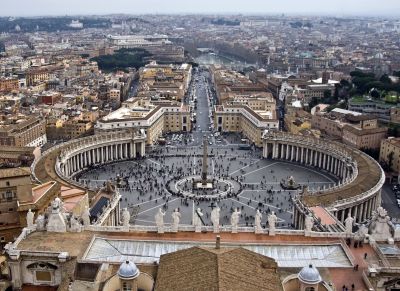













































Last week was announcement that Pope Benedict XVI will step down at the end of the month because of declining health has shocked the religious world.
Historian Dr Natalia Nowakowska points out that it is not the first abdication by a pontiff.
'There are precedents and a clear 13th Century legal basis for Benedict’s actions,' she says. 'John XVIII was recorded as having died in 1009 as a simple 'monk', possibly implying an abdication.
'Later that century, Benedict IX allegedly sold his papal title in 1045, to Gregory VI who was forced to give it up in the ensuing fall-out. Most famously, the hermit-pope Celestine V abdicated in 1294, issuing a decree which for the first time made papal resignation legal and a recognised possibility in canon law.
'More recently in 1415, Gregory XII was leaned upon by Europe’s princes to resign gracefully (like the anti-popes opposing him), and thereby end the 37-year long Great Schism.'
Nonetheless, Dr Nowakowska is clear Benedict XVI’s act is a startling one because his reason for resignation is unprecedented.
'All the medieval pontificates mentioned above were in acute crisis, whereas Benedict XVI is seen within the Catholic church as the legitimate, uncontested pope, with the support to continue for much longer,' she says.
'The reasons for earlier papal resignations have been incompetence (Celestine V) or corruption, but yesterday a pope gave up the office for the very first time on grounds of physical frailty.'
She says that if Benedict XVI’s example is followed by popes in future, his decision might mark a landmark change in how the role of pope is understood.
'The pope is, according to the Catholic church, the Vicar of Christ, directly selected by God (through the agency of the cardinals) in conclave, in the general expectation that he will serve until the end of his life; a bit like a marriage,' says Dr Nowakowska.
'This was the view taken by John Paul II, who suffered from a long illness, seeing this very public suffering as a necessary, Christ-like part of the office of pope. This contributed to the air of saintliness around the late Polish pontiff.
‘Benedict XVI, however, yesterday clearly rejected his predecessor’s model – stressing that the papacy was an office with actual functions which needed to be performed (e.g. travel).
‘The papacy, in other words, is something you do, not something you simply are. This interpretation of the office – which future popes may or may not embrace – looks modernising, pragmatic, and de-mystifies the papacy.'
She adds: 'It is a radical step, and will arguably be the Bavarian pope’s most important legacy.'
Only time will tell if retirement on grounds of ill health will become a papal tradition. Dr Nowakowska's blog, Somerville Historian, can be read in full here.
Source: University of Oxford